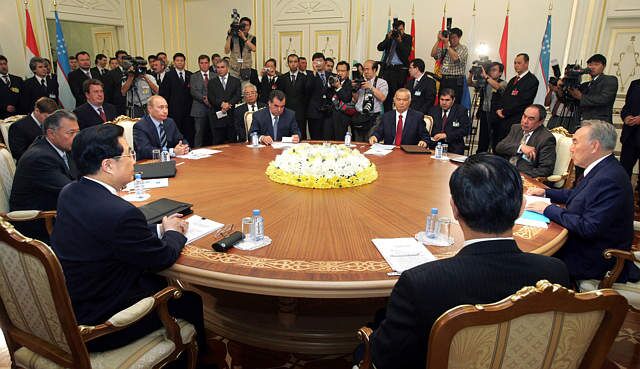
Russia, China and a Central Asian Alliance
Conceived in 2001, the Shanghai Cooperation Organization (sco) was created to promote cooperation among former Soviet nations. Since meeting that goal, the sco has quickly evolved into a larger, more influential bloc of nations spearheaded by Russia and China.
With China and Russia driving the organization, some believe the growing confederacy could potentially rival nato in its military capabilities.
Earlier this month, sco member nations (Russia, China, Kazakhstan, Kyrgyzstan, Uzbekistan and Tajikistan) met to mull over developing security and military ties, and inducting India, Pakistan and Iran into the organization.
Underlying the unification of these nations is a dangerous motive that should concern the United States. “The sco’s swift rise has been fueled by deteriorating security conditions in ex-Soviet Central Asia, as well as a hunger in Moscow and Beijing for a vehicle that could counter U.S. influence in the region” (Christian Science Monitor, October 26). The sco is a vehicle by which Russia and China seek to drive American influence from Central Asia.
Watch for the sco to grow more influential. With Russia and China at the helm, it is entirely conceivable that this organization could burgeon into a pan-Asian coalition. “China’s ambitions are growing fast, and it also wants to turn the sco into something bigger and more effective” (ibid.). Russia and China will continue to use the smaller, yet strategically located, nations of Central Asia to purge American influence in the region adjacent to their territories.
The influence and scope of the sco is sure to grow—especially if Iran, Pakistan and India are accepted as members.
Speaking to the Interfax-Military News Agency, Russian Col. Gen. Leonid Ivashov recently stated, “The sco may well turn into a union of nations with the military potential equivalent to that of nato” (October 27). This military potential is concerning.
Consider the resources at the disposal of such a military confederacy: It would have access to Russia’s military hardware and nuclear program as well as China’s massive army and growing technological capabilities—and it could freely inhabit the strategically situated land of Central Asia. Central Asian nations sit on the doorstep of both the Middle East and Europe. Include the possibility of India, Pakistan and Iran joining the club, and this military’s potential strategic capabilities grows even greater.
Ariel Cohen, senior researcher at the Heritage Foundation in Washington, is concerned with where Russia and China are taking the sco. “Four years ago, when the sco was formed, officials in Washington pooh-poohed it and declared it was no cause for concern. … Now they’re proven wrong.” Formed only four years ago, the sco has already become a central component in Asian politics.
The Central Asian alliance has been pivotal in Russia and China’s quest to purge America’s presence from the region. We can expect Russia and China to succeed in evicting America from Central Asia.
Continue to watch for alliances to form with the motive to marginalize America’s global influence. Anti-American sentiment pervades international politics as never before. America will be shunned from the stage of global politics. As the anti-America wave rolls across the globe, the U.S. is finding itself dangerously short of allies while simultaneously getting embroiled in an increasing number of controversies and wars. The U.S. military will not be able to stand such pressure much longer.
The Trumpet explains world events in the context of Bible prophecy. If you are interested in learning more about present world conditions and where events are heading, request your free subscription now.
